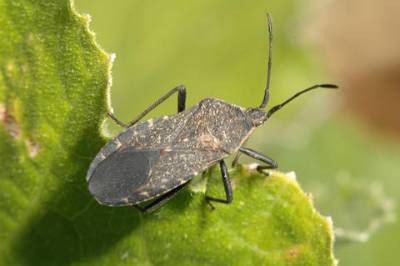Squash Bugs

These pests overwinter as adults and, in the spring, start actively looking for mates and host plants. Once mated, the females will begin laying eggs from June till mid-August. Adult squash bugs are flattened and 1/2 to 3/4 of an inch long. As an adult, squash bugs are dark-brown and have wings with brown-to-black and orange markings along the outer edge of the body. Nymphs will start light-colored, but with each successive molt, they will gradually get darker in color. Squash bugs feed on the leaves, vines, and fruits of squash, pumpkins, and other cucurbits using piercing-sucking mouthparts to remove fluid from the plants. Younger, small plants are more susceptible to damage than older plants. However, they can kill any plant if the numbers get high enough.
The first step to management is to scout for all stages of squash bugs on your plants starting in June. You can use floating row covers to exclude the squash bugs for small plantings, but you will have to remove the covers to allow bees to pollinate the flowers. For small infestations, or again a few plants, try to pick the bugs off by hand and destroy the insects. This would need to be done every 3-5 days, depending on the number of squash bugs you have. You can also place boards on the ground underneath the plants to provide an area for the insects to gather, making it easier to kill them as needed.
Use “trap plants” outside the garden to catch the mother squash bugs before they reach the main patch. You can then use insecticides or remove those plants once eggs are laid but before they hatch. Some parasitoid wasps will attack and kill squash bugs. The tachinid fly and Gryon pennsylvanicum are parasitoids that feed on squash bugs.
Insecticides are a standard method of treatment to kill squash bugs. Horticultural oils can smother eggs before they hatch and during the early nymph stages. Products containing Carbaryl (Sevin) or Permethrin can effectively control squash bugs when they are young. As the bugs get older, they get harder to kill, developing a waxy cuticle that protects them from chemicals. With any chemical application, be sure to get the underside of the leaves and apply it early in the morning or late in the evening to be less harmful to pollinators. In the fall, remove all debris and discard from the area to prevent the squash bug adults from overwintering in your garden. Try to mow the grass around the garden and reduce vegetation to reduce the insect population in your area.

Have questions? Contact our office where our Horticulture Extension Agent will assist you with questions.
Phone: (316) 321-9660
Email: callae@ksu.edu